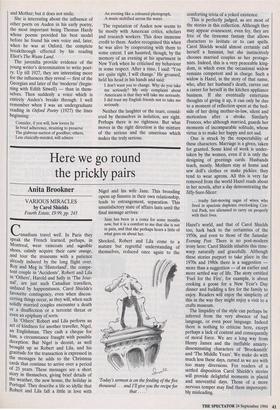Here we go round the prickly pairs
Anita Brookner
VARIOUS MIRACLES by Carol Shields Fourth Estate, £9.99, pp. 243
Canadians travel well. In Paris they speak the French learned, perhaps, in Montreal, wear raincoats and sensible shoes, calmly acquire their carte orange, and tour the museums with a patience already induced by the long flight over. Roy and Meg in 'Hinterland', the compe- tent couple in 'Accidents', Robert and Lila in 'Others', Harold and Sally in 'The Jour- nal', are just such Canadian travellers, unfazed by happenstance, Carol Shields's favourite contingency, even when discon- certing things occur, as they will, when such solidly married couples encounter a death or a disaffection or a terrorist threat or even an epiphany of sorts. In 'Others' Robert and Lila perform an act of kindness for another traveller, Nigel, an Englishman. They cash a cheque for him, a circumstance fraught with possible deception. But Nigel is decent, as well brought up as Robert and Lila, and his gratitude for the transaction is expressed in the messages he adds to the Christmas cards that continue to arrive over a period of 25 years. These messages are a short story in themselves, giving brief details of the weather, the new house, the holiday in Portugal. They describe a life so idyllic that Robert and Lila fall a little in love with Nigel and his wife Jane. This brooding opens up fissures in their own relationship, leads to estrangement, separation. This unsatisfactory state of affairs lasts until the final message arrives:
Jane has been in a coma for some months now, but it is a comfort to me that she is not in pain, and that she perhaps hears a little of what goes on about her.
Shocked, Robert and Lila come to a mature but regretful understanding of themselves, reduced once again to the Today's sermon is on the feeding of the five thousand . . . and I'll give you the recipe for that . . . comforting trivia of a yoked existence.
This is perfectly judged, as are most of the stories in this collection. Although they may appear evanescent, even fey, they are free of the tiresome fantasy that allows characters to levitate or to cast spells. Carol Shields would almost certainly call herself a feminist, but she instinctively chooses married couples as her protago- nists. Indeed, this is a very peaceable king- dom, in which even the occasional widow remains competent and in charge. Such a widow is Hazel, in the story of that name, who, after her husband's death, carves out a career for herself in the kitchen appliance business. If she eventually entertains thoughts of giving it up, it can only be due to a moment of reflection spent at the bed- side of her dying mother-in-law, silent and motionless after a stroke. Similarly Frances, who although married, guards her moments of incomparable solitude, whose virtue is to make her happy and not sad.
One is struck by the respectability of these characters. Marriage is a given, taken for granted. Some kind of work is under- taken by the women, even if it is only the designing of greetings cards. Husbands teach, mostly. Mothers stay at home and sew doll's clothes or make pickles: they tend to wear aprons. All this is very far removed from the world Hazel reads about in her novels, after a day demonstrating the Jiffy-Sure-Slicer:
. . . trashy fast-moving sagas of wives who lived in spacious duplexes overlooking Cen- tral Park, too alienated to carry on properly with their lives.
Hazel's world, and that of Carol Shields too, hark back to the certainties of the 1950s, and even to those of the Saturday Evening Post. There is no post-modern irony here: Carol Shields inhabits this time- warp naturally and gracefully. Although these stories purport to take place in the 1970s and 1980s there is a suggestion more than a suggestion — of an earlier and more settled way of life. The story entitled `Fuel for the Fire', for example, is about cooking a goose for a New Year's Day dinner and building a fire for the family to enjoy. Readers will enjoy the simplicity of this in the way they might enjoy a visit to a crafts museum.
The limpidity of the style can perhaps be inferred from the very absence of bad language, or even poor language. Indeed there is nothing to criticise here, except perhaps a lack of content and consequently of moral force. We are a long way from Henry James and the ineffable anxiety- disseminating characters of 'Brooksmith' and 'The Middle Years'. We make do with much less these days, cursed as we are with too many diversions. For readers of a settled disposition Carol Shields's stories will provide delightful moments in placid and uneventful days. Those of a more nervous temper may find them impercepti- bly misleading.


































































 Previous page
Previous page